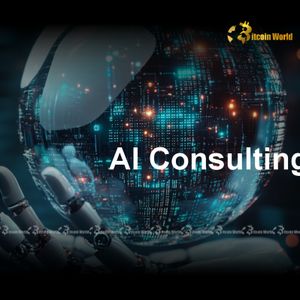BitcoinWorld AI Consulting: Unleashing Transformative AI Disruption in the Future of Consulting In the rapidly evolving landscape of technology, the convergence of artificial intelligence and traditional industries is creating unprecedented opportunities and challenges. For those keenly following the cryptocurrency and blockchain space, the concept of decentralization and radical transformation is familiar. Now, a similar wave of change is sweeping through established sectors, particularly in the realm of professional services. The conversation around AI consulting is no longer theoretical; it’s a pressing reality that promises to redefine how businesses operate and how value is created. Navin Chaddha, managing director at the venerable Silicon Valley venture firm Mayfield, offers a compelling vision of this future, suggesting that AI will profoundly reshape industries like consulting, law, and accounting. The Dawn of AI Disruption in Services: A $5 Trillion Market at Stake Navin Chaddha posits that the $5 trillion market encompassing law firms, consulting companies, and accounting services is ripe for complete reimagination by AI-first enterprises. This isn’t merely a PowerPoint presentation concept; it’s a conviction born from decades of observing technological shifts, from mainframes to the cloud, and now, the AI era. Chaddha views AI as a 100x force, a multiplier that will team up with humans to enhance capabilities and fundamentally reimagine business processes. Just as e-business transformed brick-and-mortar operations and offshoring reshaped software services, AI disruption is set to be the next monumental wave. The core idea is simple yet powerful: repetitive tasks will increasingly be handled by AI, freeing human talent for more complex, relationship-driven work. This transformative shift will manifest in two primary models: organic growth through AI integration within existing structures, and inorganic growth through strategic acquisitions that infuse AI capabilities. The implications for productivity and efficiency are vast, paving the way for a new paradigm in service delivery. Rethinking AI Business Models : From Time to Outcome One of the most radical shifts AI brings to the service industry is a departure from traditional time-based billing. Imagine implementing a complex system like Salesforce. Traditionally, this involves human consultants billing by the hour. Chaddha envisions a future where AI takes the lead, acting as the primary ‘horse’ for the task. The human remains ‘in the loop’ for elements AI cannot yet handle, but the bulk of the work is automated. This transition enables customers to pay for AI services only when they are utilized, much like cloud billing or electricity consumption. This is the essence of outcome-based pricing, a stark contrast to the hourly or monthly contractor fees prevalent today. This innovative approach to AI business models allows for dramatically higher gross margins. While human-led services might yield 30% to 40% margins, AI-driven work can achieve an impressive 80% to 90%. This blend could result in overall margins of 60% to 70%, translating into substantial net income for service companies. This financial model stands in contrast to many tech companies that often rely heavily on venture capital and public market funding for profitability. The shift to outcome-based pricing, facilitated by AI, could make service businesses inherently more profitable and sustainable. Real-World Impact: How AI Consulting is Already Delivering To illustrate the tangible impact of AI, Chaddha points to Gruve, an AI tech consulting startup that recently secured Series A funding from Mayfield. Gruve’s founders, seasoned entrepreneurs with a track record of building and scaling successful service companies, identified a critical opportunity in managed security services. They acquired a $5 million security consulting firm and immediately integrated AI into its operations, focusing all future growth through AI-powered solutions. Within six months, Gruve’s revenue soared from $5 million to $15 million, boasting an astounding 80% gross margin. Their approach epitomizes outcome-based pricing: customers pay zero upfront but are charged only if a security event occurs or if specific services are rendered upon detection. This model resonates deeply with clients like Cisco, who prefer paying for guaranteed outcomes rather than for the mere presence of security personnel. This example powerfully demonstrates how AI consulting is not just a concept but a proven strategy for rapid growth and profitability, particularly in specialized, high-value areas like cybersecurity. Navigating the Future of Consulting : The Innovator’s Dilemma and Market Expansion A crucial question arises: why can’t established giants like McKinsey, Accenture, or Infosys simply acquire these AI capabilities? Chaddha argues that this is where the ‘innovator’s dilemma’ comes into play. Much like enterprise software companies struggled to transition from perpetual licenses to SaaS models due to entrenched revenue streams, large consulting firms face a similar challenge. Their existing business models, based on predictable, often time-based revenue, make it difficult to embrace a utility-based, outcome-driven model that could initially decrease their reported revenues. This inertia creates a massive opportunity for startups. Instead of directly competing with the Accentures of the world, Chaddha advises targeting the ‘neglected masses’ – the 30 million small companies in the U.S. and 100 million worldwide that cannot afford traditional knowledge workers. AI can serve these fragmented markets by providing services as software, charging per event rather than per hour or month. Imagine AI-powered receptionists, schedulers, website builders, or even startup funding form generators with human oversight for negotiations. This strategy not only avoids head-on competition but also significantly expands the overall market for consulting services, democratizing access to expertise previously out of reach. While today’s small AI firms aren’t competing with the giants, Chaddha predicts that in a decade, these agile, AI-first companies will be formidable rivals, shaping the true future of consulting . The Strategic Advantage: Investing in Service Industry AI Mayfield’s commitment to this vision is evident in its allocation of $100 million from its recently raised funds specifically for ‘AI teammates.’ Chaddha clarifies that an AI teammate is not merely a tool or a copilot but a digital companion that collaborates with humans on shared goals to achieve superior outcomes. The aim is not replacement but augmentation and collaboration. While job displacement is an inevitable short-term consequence of technological advancement, Chaddha maintains an optimistic long-term view. Humans are adaptable, acting as the ‘jockey’ to AI’s ‘horse.’ Past waves, from Microsoft Word to Excel, Uber to Lyft, initially sparked fears of job loss but ultimately led to market expansion and the creation of new roles. This principle applies profoundly to the service industry AI landscape. AI will perform work where human talent is currently unavailable, particularly in emerging markets that leapfrogged landlines for cellular technology. Investing in this market requires more than just chasing buzzwords; it demands discipline, a clear ‘North Star,’ and immunity to FOMO (Fear Of Missing Out). Chaddha emphasizes that venture capital is fundamentally a money management business, focused on multiplying capital, not just collecting logos. While significant wealth will be generated in this AI cycle, he cautions that many will also incur losses due to a lack of strategic discipline. Success, he suggests, is an art honed over years of practice and navigating various market cycles. A New Era of Collaboration and Opportunity The rise of AI marks a pivotal moment for the service industry, promising an era of unprecedented efficiency, accessibility, and profitability. While the path to this future may involve short-term pain in job displacement, the long-term outlook, as articulated by Navin Chaddha, is one of expansive opportunity and reimagined human potential. The transformation from time-based billing to outcome-based pricing, the focus on underserved markets, and the development of collaborative AI teammates are not just trends; they are foundational shifts that will reshape the economic landscape. Businesses and investors who embrace these changes with foresight and discipline stand to gain immensely in this powerful new AI-driven world. To learn more about the latest AI business models, explore our article on key developments shaping AI, Models, etc. institutional adoption. This post AI Consulting: Unleashing Transformative AI Disruption in the Future of Consulting first appeared on BitcoinWorld and is written by Editorial Team



















